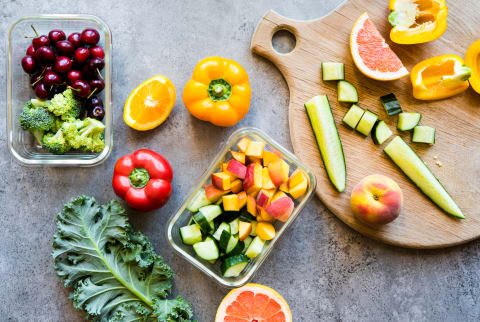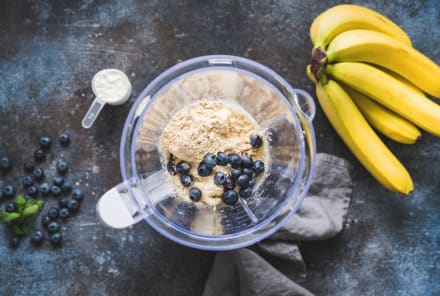Advertisement
Stock Up On These Foods To Fight Frailty, Research Suggests


It's never too early to think about healthy aging. And no matter your age, you can use food to build a strong body that will support you for years to come. Research outlines the benefits of eating specific fruits and vegetables, including lowering the odds of frailty onset as you age.
Onions and berries and grapes—oh my!
There are already a lot of science-backed reasons to eat flavonoid-rich foods (like berries or onions). Consuming flavonoids1 can help reduce the risk of certain cancers, metabolic disorders, and cardiovascular diseases.
But what are flavonoids? Quick science lesson: Flavonoids are a type of phenolic compound found in many plant-based foods, such as fruits, vegetables, grains, tea, and wine2. They have antioxidant and anti-inflammatory properties and are often included in supplements because of their many positive health benefits.
Quercetin, a type of flavonoid antioxidant, has been shown to remove free radicals3, which can lead to the development of Alzheimer's, renal diseases, and cardiac abnormalities1.
A study found that there may be another reason to include more quercetin in your diet: to fight off frailty as you age. Consuming a higher intake of flavonoids, specifically quercetin, has been associated with lower odds of frailty onset in older adults4, according to a recent study published in the American Journal of Clinical Nutrition.
Researchers studied individuals who participated in the large Framingham Heart Study with no frailty at the start of the study. The study looked at the relationship between participants' frailty and flavonoid intake over time. (The mean age of individuals studied was 58 years old.)
The study concluded that higher flavanol intake was associated with 20% lower odds of frailty onset4, while odds decreased even further (about 35% lower odds) with higher quercetin intake.
How to consume more quercetin
Fortunately, it's pretty easy to incorporate more quercetin into your diet, as it naturally occurs in several foods and can be found in supplements.
On average, people consume about 40 milligrams of quercetin daily (unless you already eat a diet rich in fruits and veggies, then you may be getting around 200 to 500 milligrams). To reap the most benefits, you may want to up your consumption considerably to about 500 milligrams.
First, get some capers: Capers (those little green balls that are reminiscent of olives and usually found on a salmon bagel) are the richest natural source of quercetin5. Capers are actually edible flower buds, and they're normally pickled. You can find them in a jar in the grocery store, probably near the olives.
Boost your fruit and vegetable intake with a supplement: For when it's difficult to eat the full recommended amount of fruits and vegetables every day (doctors suggest you consume 1.5 to 2 cups of fruit and 2 to 3 cups of vegetables daily), you can supplement your intake with a powder or capsule that is packed with quercetin. We've compiled a list of fruit and vegetable supplements that meet our standards—and will help bring some more vitamins, nutrients, and antioxidants into your diet.
Eat colorful fruit: Have a quercetin-rich picnic with fruits like cherries, berries, grapes, red apples, tomatoes, and citrus. Those brightly colored fruits contain high amounts of quercetin1, not to mention other healthy properties, like fiber and vitamins.
Try adding onion and broccoli to your meals: Fruits don't get to have all the fun. Vegetables, including red onions, bell peppers, Brussels sprouts, kale, and broccoli, also contain a lot of quercetin1. Plus, broccoli has been shown to help aid digestion and decrease bloating6.
Or drink it: Tea and wine lovers rejoice: Both beverages are high in quercetin. Red wine, specifically, has been linked to increased quercetin absorption7. But remember, those health benefits are easily overshadowed by more negative effects when drinking in excess, so enjoy your Shiraz in moderation.
The takeaway
Flavonoids, especially quercetin, are known for their many health benefits and antioxidant qualities—and the list keeps growing. Research found an association between higher quercetin intake and lower odds of frailty onset in aging adults. You can add more quercetin to your diet by eating certain foods and taking nutrient-rich supplements.
7 Sources
- https://www.ncbi.nlm.nih.gov/pmc/articles/PMC5214562/
- https://www.ncbi.nlm.nih.gov/pmc/articles/PMC5465813/
- https://www.ncbi.nlm.nih.gov/pmc/articles/PMC6470739/
- https://www.sciencedirect.com/science/article/abs/pii/S0002916523468426?via%3Dihub
- https://www.ncbi.nlm.nih.gov/pmc/articles/PMC7343821/
- https://pubmed.ncbi.nlm.nih.gov/30317146/
- https://www.ncbi.nlm.nih.gov/pmc/articles/PMC1760706/











